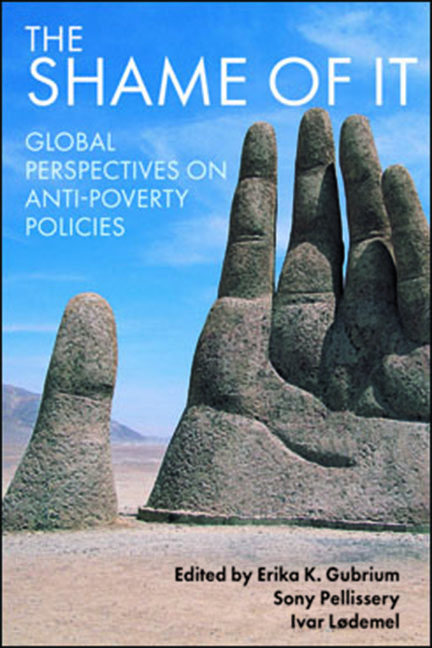Book contents
- Frontmatter
- Dedication
- Contents
- Notes on contributors
- Acknowledgements
- Preface
- one Resetting the stage
- two New urban poverty and new welfare provision: China’s dibao system
- three Thick poverty, thicker society and thin state: policy spaces for human dignity in India
- four Self-sufficiency, social assistance and the shaming of poverty in South Korea
- five ‘Not good enough’: social assistance and shaming in Norway
- six Pakistan: a journey of poverty-induced shame
- seven Separating the sheep from the goats: tackling poverty in Britain for over four centuries
- eight ‘Food that cannot be eaten’: the shame of Uganda’s anti-poverty policies
- nine Shame and shaming in policy processes
- ten Towards global principles for dignity-based anti-poverty policies
- Index
ten - Towards global principles for dignity-based anti-poverty policies
Published online by Cambridge University Press: 03 February 2022
- Frontmatter
- Dedication
- Contents
- Notes on contributors
- Acknowledgements
- Preface
- one Resetting the stage
- two New urban poverty and new welfare provision: China’s dibao system
- three Thick poverty, thicker society and thin state: policy spaces for human dignity in India
- four Self-sufficiency, social assistance and the shaming of poverty in South Korea
- five ‘Not good enough’: social assistance and shaming in Norway
- six Pakistan: a journey of poverty-induced shame
- seven Separating the sheep from the goats: tackling poverty in Britain for over four centuries
- eight ‘Food that cannot be eaten’: the shame of Uganda’s anti-poverty policies
- nine Shame and shaming in policy processes
- ten Towards global principles for dignity-based anti-poverty policies
- Index
Summary
The context in which policy-making and delivery occurs is important when analysing the impact of policy. A brief example illustrates this point. One of the low-income respondents in rural Uganda invited us to her homestead. Her home was a hut made of dried mud with no windows. She hoped to be able to mend the thatch roof before the next rainy season. The empty dirt floor was just big enough for the floor mats that were rolled out at bedtime. Her family of five spent most of the time outside in front of the hut, where they prepared meals, washed and did homework for as long as daylight allowed. We were not invited to the homes of the Norwegian respondents, but we can imagine a contrasting scenario from stories told to us and the wealth of statistics that support it. A low-income respondent with a family of three is likely to live in a four-room apartment, built to high Norwegian building standards, with a fully equipped kitchen and bathroom. The children will likely have their own bedroom. When they are driven to school in a 15-year-old car the children wear clothes that only the inquisitive eyes of their peers can distinguish from that of other children. The respondent is unemployed and has not established entitlement to unemployment insurance, yet the local authority is obliged by law to pay her means-tested social assistance sufficient to maintain the resources and activities described.
The poverty experiences that have been relayed in the empirical chapters and the analysis presented in Chapter Nine demonstrate vastly different worlds with varying normative expectations concerning those on the receiving and delivering end of policy. Despite these differences, however, the low-income respondents in Uganda and Norway expressed strikingly similar feelings and experience of shame as they contrasted their own socioeconomic positions with that of their peers. Our analysis of the policy–shame nexus across the seven settings took account of both the surprising similarities and the enormous contextual differences.
Rather than effectiveness in the sense of providing a minimum income guarantee or the necessary food items, the definition of the impact of policy in this volume boils down to the psychosocial impact that policies have had on individual recipients. We focused in particular on the potential of policy to heighten shame or to build dignity.
- Type
- Chapter
- Information
- The Shame of ItGlobal Perspectives on Anti-Poverty Policies, pp. 199 - 220Publisher: Bristol University PressPrint publication year: 2013



